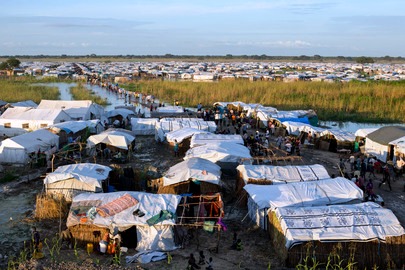IDPs blame ethnic Nuer members in gov’t for peace delay
August 7, 2015 (KAMPALA) – South Sudan’s Nuer tribe which members are being forced by the 20-month long conflict to take sanctuary in the United Nations protection of civilians site in the national capital, Juba, have accused their counterparts allied to president Salva Kiir on working to block Intergovernmental Authority for Development’s (IGAD) alternative proposal to end the war.

John Makuei, one of the internally displaced persons (IDPs) who marched on Thursday with thousands others from the camp, said he was much bothered with position of Nuer in the government for wanting the suffering of people to continue.
“That IGAD peace proposal it is not the Dinka who refuse it to be signed. But these are individuals from sons and daughters from Nuer who want to trade your blood within the government. Let work for peace among ourselves; let us not look our brother Dinka as enemies,” he added.
Makuei said there were a number of factors that could be considered to forgive each other in term of reconciliation, but he accused members from Nuer in government against unity of the Dinka and the Nuer ethnic groups.
He called upon President Salva Kiir and South Sudan rebel leader Riek Machar to end the war and bring peace rather than being driven by what he described as “spoilers.”
However Makuei gave an example of the comprehensive peace agreement signed between Sudanese government and former guerrilla movement in 2005 despite bitter enmity and death that occurred between the two regions.
“After peace agreement in 2005, with the Arabs from the north but we came together as brothers and sisters despite all implication of decade the civil war. South Sudanese must come together and work for peace,” he added.
He called on Nuer tribe particularly to work for peace, and urged the Dinka people to let go the “evil of tribalism” and put the country’s unity as priority.
“Dinka are our brothers, we must work together and leave aside our differences. God says forgive those who have done you wrong for thy kingdom shall belong to you,” he added, while referring to the alleged massacre of 20,000 Nuer civilians in Juba in December 2013.
Rebecca Nyachiew Gatkuoth, a 30 years old mother of five children living in the camp also told Sudan Tribune over phone interview that they were crying for peace. She called on neighbouring countries to impartially work for peace for South Sudanese rather than their interest to “rob our resources.”
She accused IGAD of putting their interest first, saying it does not care about the very people of South Sudan whom they helped to achieve independence.
She also lamented about loss of lives in the camps as many of their children, she said, have died as a result of poor condition they faced for almost two years in the UN camps across the country.
“Our children all the time suffer in this camp facility, we need to go home. Many of our children die every day, this is due to much congestion and fear of returning homes. We need peace; we do not need anything apart from peace,” she added.
Dabuol Both Luak, an organizer of the protest, said he hoped for peace, but still kept uncertainty on possibility for peace to be achieved between the warring parties. He blamed some government officials in the country for not ready for peace but prepare for war.
“Sometimes we could say peace will come, a time no one believe that there will be peace because the government is refusing the peace, but through God willing, we hope for peace to come in this country,” Luak said.
Although the two warring parties are given an ultimatum deadline of 17 August, still some people lack trust on South Sudanese leaders for prolonging the war, which claimed tens of thousands of lives and massive displacement of 2 million people as refugees with over 160,000 IDPs across the war-ravaged nation.
(ST)
